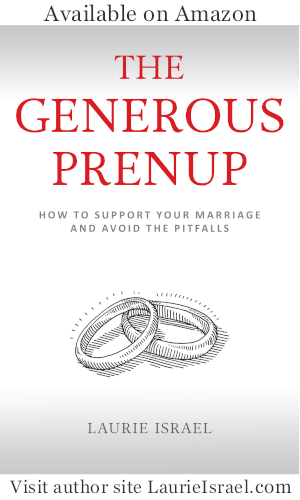Premarital discussion about finances and money is a good thing. But if the goal of that discussion is a formal, signed prenuptial agreement, the process is fraught with problems and can pose significant damage to the upcoming marriage.
 Prenuptial agreements do have their uses. They can be crucial peacemakers for couples who marry later in life, especially when there are children from a previous marriage. But in first marriages especially, they can set up permanent friction, including conflict between a spouse and the parents of the more-moneyed spouse, who are often the shadow parties behind the idea of having a prenup.
Prenuptial agreements do have their uses. They can be crucial peacemakers for couples who marry later in life, especially when there are children from a previous marriage. But in first marriages especially, they can set up permanent friction, including conflict between a spouse and the parents of the more-moneyed spouse, who are often the shadow parties behind the idea of having a prenup.
Many prenups are unnecessary, overly broad, and mean-spirited. These agreements foster marital selfishness, a destructive force for the couple and their upcoming marriage. Often, particularly in first marriages, the less-moneyed spouse is contracting away economic marital rights without even understanding what marriage entails. That spouse may give away part of the important money facet of marriage, not realizing that financial security and sharing add to the strength of a marriage. The prenup causes the marriage to become imbalanced and weakens it.
Prenuptial agreement negotiations (generally through lawyers) are hurtful to both spouses. The spouse who has withheld money and marital rights from the other will be sensed as a “brute” (and will probably feel like one). The less-moneyed spouse resents the process and will feel mistreated, for good reason — that spouse is the victim of what is essentially an unfair bargain.
Many prenups begin with a typical “off the shelf” agreement that is quite harsh. It provides that each party’s past and future assets and income belong to that party, except for property intentionally put into joint names. This type of prenup has no inheritance requirement if the marriage is intact when one party to it dies. And often there is a waiver of alimony provision no matter what the facts of the marriage are or the needs of a party turn out to be at the time of a divorce.
There are many problems with prenups, even when they are not as severe as the “off the shelf” one described above. They often result in agreements that are overbroad, rather than just dealing with the issues that the parties wish to address. If the parties want to isolate inheritance or premarital assets from the marital pie, why not just address that particular issue and leave the rest of the marriage intact? Marital laws are intended to provide good, sensible results for financial issues in every type of factual situation as they develop through the course of a long-term marriage. Why jettison these laws?
The negotiations (generally through the parties’ attorneys) are almost always very painful and corrosive to the upcoming marriage at the outset. The damage to the marriage could be permanent, especially if the terms of the prenup are not generous. The playing field tends not to be level, because the less-moneyed spouse is already committed to the relationship. Often the only way to change the prenup terms for that spouse is to call off the marriage – not a good result.
Because of these problems, I have come to practice prenuptial agreement mediation. It is a way for the couple to meet face to face with the help of a neutral mediator. The mediator should be well versed with the issues relating to marriage, divorce, inheritance, and estate planning. The mediator serves to level the playing field, and ensure the values and thoughts of each of the parties is communicated freely. In this way the parties can be helped in formulating a fair and workable prenup with full input and consent on both of their parts. The last step in the process is for the couple to each consult with a separate attorney on their behalf.
Although prenuptial agreements are written about positively in most of the media (except by me and a few others), they should not be promoted or given away “like candy”, i.e., as if they are harmless. They are not. Having a negotiation about withholding property is not a very good way to begin a relationship that should to be built on love, trust, mutual protection and generosity. If there is a good reason to have one, make it reflect both parties’ wishes, not just one party’s, and make it as narrow and customized to the particular situation as possible.
- Mediation – A Sound First Step to a Successful Prenup - September 27, 2022
- The Art of the Term Sheet - May 18, 2022
- Learning from Every Mediation - August 4, 2021


